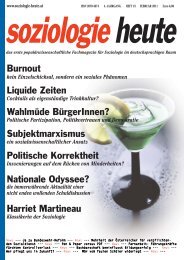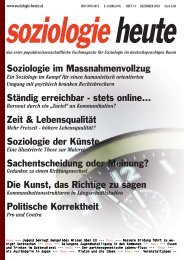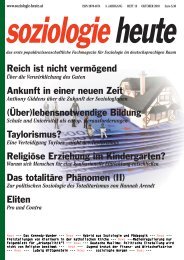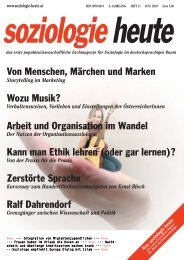soziologie heute April 2009
Das erste und einzige illustrierte soziologische Fachmagazin im deutschsprachigen Raum. Wollen Sie mehr über Soziologie erfahren? www.soziologie-heute.at
Das erste und einzige illustrierte soziologische Fachmagazin im deutschsprachigen Raum.
Wollen Sie mehr über Soziologie erfahren? www.soziologie-heute.at
Sie wollen auch ein ePaper? Erhöhen Sie die Reichweite Ihrer Titel.
YUMPU macht aus Druck-PDFs automatisch weboptimierte ePaper, die Google liebt.
<strong>April</strong> <strong>2009</strong> <strong>soziologie</strong> <strong>heute</strong> 45<br />
Veranstaltungen<br />
Berufsverband Deutscher Soziologinnen<br />
und Soziologen e. V.<br />
XV. Tagung für angewandte<br />
Soziologie <strong>2009</strong><br />
Die nächste große Verbandstagung des BDS<br />
findet am 5. und 6. Juni <strong>2009</strong> an der Universität<br />
Hamburg in Kooperation mit den soziologischen<br />
Instituten statt. Im Mittelpunkt der<br />
Tagung stehen Antworten auf die Frage, welche<br />
Begriffe, Konzepte, Theorien und Methoden<br />
der Soziologie in der außeruniversitären<br />
Praxis sich bewährt haben.<br />
Schweizerische Gesellschaft für<br />
Soziologie<br />
„Identität und Wandel der Lebensformen”<br />
07.09.<strong>2009</strong> - 09.09.<strong>2009</strong>, Universität Genf<br />
Vom soziologischen Grundbegriff der Identität<br />
ausgehend sollen Identitätskonstruktionen<br />
im Kontext des Wandels der Lebensformen,<br />
bzw. der Einfluss des sozialen Wandels auf die<br />
Identität(-en) thematisiert werden. Und dies<br />
in möglichst vielen Feldern, von der Familie<br />
über die Schule, der Berufs- und Arbeitswelt,<br />
der Geschlechterordnung bis hin zu Wissenschaft<br />
und Politik.<br />
Folgende Plenarveranstaltungen sind vorgesehen:<br />
Plenum 2: Identität in Arbeit und Beruf<br />
Plenum 1: Identität im Spannungsfeld von Migration<br />
und Ethnizität<br />
Plenum 3: Identität im Blickfeld von Theorien<br />
und Methoden<br />
Plenum 4: Identität und Sozialpolitik<br />
Plenum 5: Identität, Geschlecht und soziale<br />
Differenz<br />
Plenum 6: Identität, Konsum und Lebensstil<br />
Plenum 7: Identität und Medien<br />
Plenum 8: Identität und Lebensläufe<br />
Plenum 9: N.N.<br />
Plenum 10: N.N.<br />
Mehr infos: http://www.sagw.ch/de/<strong>soziologie</strong>/Agenda/Callsfor-Papers/SGS-Kongress-<strong>2009</strong>.html<br />
The BSA Annual<br />
Conference <strong>2009</strong><br />
16-18 <strong>April</strong> <strong>2009</strong><br />
Cardiff City Hall, UK<br />
Much thinking about the social sciences<br />
sees them as based on shared disciplinary<br />
assumptions. The increasing globalisation<br />
of social inquiry is challenging current disciplinary<br />
formations, bringing in its train issues<br />
of the relationship between the research activities<br />
of different ‘national’ communities of research<br />
scholars, as each is drawn to address<br />
networks of interaction and exchanges beyond<br />
the boundaries of national societies<br />
(which are frequently the focus of national<br />
funding bodies, if not, as some have argued,<br />
also embedded within the conceptual apparatus<br />
of disciplines). In response, there have<br />
been calls to ‘provincialize’ the dominant European<br />
and North American constructions of<br />
social science in order to accommodate perspectives<br />
from other locations of knowledge,<br />
both spatial and ‘epistemological’. These<br />
have occurred alongside the advocacy of a<br />
new ‘universalistic’ critical social theory with<br />
‘cosmopolitan intent’.<br />
Recent studies of disciplinary social science<br />
also suggest that wider cultural values and<br />
socio-political changes have an important impact<br />
on research agendas and, in a global age,<br />
these are no more likely to be ‘shared’ than<br />
disciplinary assumptions. The post second<br />
world war period was marked by the growth<br />
of professionalised disciplinary social science<br />
and the consolidation of welfare states in the<br />
context of the cold war. It was also a period<br />
of de-colonisation, although the colonial contexts<br />
in which the social sciences were formed<br />
was not recognised and it was not until<br />
recently that post-colonial critiques have begun<br />
to have an impact.<br />
In these contexts, the collapse of communism<br />
has both helped to usher in the current phase<br />
of globalisation and has altered fundamentally<br />
the structures of value-relevance that inform<br />
social inquiry in post-communist societies,<br />
formerly non-aligned societies and liberal<br />
democracies alike. Although the collapse of<br />
communism has been associated with the<br />
re-assertion of liberal values (and neo-liberal<br />
public policies of governance), it is also associated<br />
with a decline in the secular values<br />
with which liberalism and modernity are conventionally<br />
associated and which would be intrinsic<br />
to any claim to replace ‘national’ social<br />
science with a ‘cosmopolitan’ social theory.<br />
The conference will address these problems<br />
of global social science and their implications<br />
for sociology.<br />
The BSA Annual Conference <strong>2009</strong> (and also<br />
2010) will be organised in a different way than<br />
in previous years.<br />
Designed to be less theme-led, and to encourage<br />
the widest participation for presenters<br />
and attendees, it will have streams around<br />
core areas of sociological research and enquiry.<br />
While there is a core team, (led by John<br />
Holmwood from Birmingham) each stream<br />
will have its own convenor(s) who will select<br />
the papers, symposium and panels to go into<br />
that stream. This is somewhat similar to the<br />
ISA’s form of organisation. The aim is to have<br />
a sub-plenary within each stream.<br />
Nähere Infos:<br />
http://www.britsoc.co.uk/events/Conference.htm<br />
1. Österreichischer<br />
Präventionskongress<br />
„Herausforderung Gewalt - Chancen<br />
vernetzter Prävention“<br />
15. bis 16. Mai <strong>2009</strong>, Graz<br />
Gewaltprävention – von der Nabelschnur bis<br />
zu den SeniorInnen – wird auf dem Kongress<br />
von Fachleuten nach neuesten Erkenntnissen<br />
erstmals in Österreich thematisiert. In<br />
Vorträgen und Workshops haben die TeilnehmerInnen<br />
die Möglichkeit, praxisnahe und<br />
lösungsorientierte Informationen, Handlungsanleitungen<br />
und Lösungsmöglichkeiten zu erhalten!<br />
Nähere Infos:<br />
http://www.praeventionskongress.at<br />
18. Österreichischer<br />
Gesundheits- und Krankenpflegekongress<br />
Pflege über die Grenzen hinaus -<br />
Was können wir voneinander lernen?<br />
17.- 19. Juni <strong>2009</strong> Congress Center<br />
Villach<br />
Der 18. Österreichische Pflegekongress möchte<br />
die Schlüsselrolle, welche die Pflege nicht<br />
nur im geografischen sondern auch im geistigen<br />
Sinne über die Grenzen hinaus hat, exemplarisch<br />
aufzeigen. Dieser Kongress soll den<br />
Zugang und die Weitergabe von Pflegewissen<br />
quer durch die Fachgebiete, Kulturen und<br />
Länder ermöglichen.<br />
Die Hauptziele des Kongresses sind:<br />
- Informierte und nachhaltige Führung in Politikstrukturen<br />
und in der Pflege zu verbessern<br />
- Beitrag der Pflege in politischen Themen aufzuzeigen<br />
- Förderung von Führung (Leadership) im Gesundheitssektor<br />
Nähere Infos:<br />
http://www.oegkv.at<br />
2. Studentischer<br />
Soziologiekongress<br />
„Soziologie zwischen Theorie & Praxis“<br />
08. bis 10. Oktober <strong>2009</strong>, München<br />
Das Verhältnis von Theorie zu Praxis soll auf<br />
dem zweiten Studentischen Soziologiekongress<br />
kritisch beleuchtet werden. Hat sich die<br />
Soziologie wirklich von ihrem Forschungsgegenstand<br />
der realen Gesellschaft entfremdet?<br />
Stehen Theorie und Praxis im Widerspruch<br />
zueinander – und muss dies als Problem gesehen<br />
werden? Wie sieht Forschung nicht nur<br />
über sondern auch für die soziale Praxis aus?<br />
Nähere Infos:<br />
http://www.ssk<strong>2009</strong>.fachschaft.<strong>soziologie</strong>.uni-muenchen.<br />
de/index.html

















